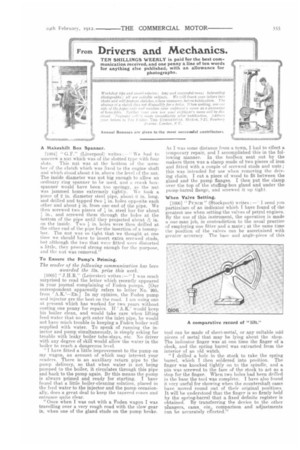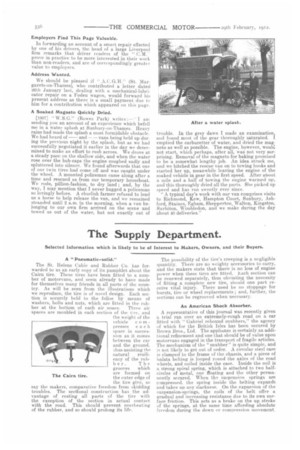From
Page 19

Page 20

If you've noticed an error in this article please click here to report it so we can fix it.
Drivers and Mechanics.
TEN SHILLINGS WEEKLY is paid for the best communication received, and one penny a line of ten words for anything else published, with an allowance for photographs.
Workshop tips and smart rello irg ; long and snccessful 31211..5 ; interesting photographs ; ail are suitable subjects. We will knock .your letters inio sheil5c and mill prepare sketches, where necessary, before kublicaiion. The absence of a. sketch k-goes not disqualify for a prize,. ll'i/en uniting, use oae side of the paper rely a Iidmention your employer's name as a ,E7taranit:e of bona fides, Nei/ber 'rein mun 1707 your employer's vame :Dili be disclosed_ Payment :,-;7; be made immediately al ter Publication. Address _^..,oer fellers to Tire l-fdittr. THE COMMERCIAL MOTOR, 7-P5, Rosebery
Avenue. London, E C.
Annual Bonuses are given to the most successful. contributors
A Makeshift Box Spanner.
110041 " OF." (Liverpool) writes : " We had to unscrew a nut which was of the slotted type with four
slots. This nut was at the bottom of the member +if the clutch which was fixed to the engine shaft and which stood about 4 in, above the level of the nut. The inside diameter was not big enough to allow an ordinary ring spanner to be used, and a crank boxspanner would have been too springy, as the nut was jammed home extremely tightly. We took a piece of 2 in. diameter steel pipe, about 0 in. long, and drilled and tapped two in. holes opposite each other and about in. from one end of the pipe. We then screwed two pieces of in. steel bar for about in., and screwed them through the holes at the bottom of the pipe until they projected about T3E in. on the inside. Two:II in. holes were then drilled at the other end of the pipe for the insertion of a. tommybar. The nut was so tight that we thought at one time we should have to insert extra screwed studs, but although the two that were fitted were distorted a little, they praved strong enough for the purpose, and the nut was removed."
To Ensure the Pump's Priming.
The sender of the follou?:ing communication has bees. awarded the 10s. prize this week.
11005] " J.H.R." (Leicester) writes :—" I was much surprised to read the letter which recently appeared in your journal complaining of Foden pumps. [Our correspondent apparently refers to letter No. 995, from `A.K.1—ED.] In my opinion, the Foden pump and injector are the best on the road. I am using one at present which has worked for two years without costing one penny for repairs. If' AK.' would keep his boiler clean, and would take care when lifting feed-water that no grit enter the inlet pipe, he would not have mulch trouble in keeping a Foden boiler well supplied with water. To speak of running the injector and pump simultaneously, is simply asking for trouble with leaky boiler tube-stays, etc. No driver with any degree of skill would allow the water in the boiler to reach a dangerous level.
"I have fitted a 'little improvement to the pump on my wagon, an account of which may interest your readers. There is an auxiliary return pipe to the i
pump delivery, so that when water s not being pumped to the boiler, it circulates through this pipe and back to the pump again. By this means the pump is always primed and ready for starting. I have found that a little boiler cleaningsolution, placed in the feed water to the injector and the pump occasionally, does a great deal to keep the tapered cones and entrance quite clear.
"Once when I was out with a Foden wagon I was travelling over a very rough road with the slow gear in, when one of the gland studs on the pump broke. As I was some distance from a town, I had to effect a temporary repair, and I accomplished this in the following manner. In the toolbox sent out by the makers there was a clamp made of two pieces of iron and fitted with a couple of screwed studs and nuts ; this was intended for use when removing the driving chain. I cut a piece of wood to fit between the gland and the pump flanges. I then put the clamp over the top of the stuffing-box gland and under the pump-barrel flange, and screwed it up tight.
When Valve Setting.
[1000] a PITNCH" (Stockport) writes :—' J. send you particulars of an indicator which I have found of the greatest use when setting the valves of petrol engines. By the use of this instrument, the operation is made a, one-man job, in contradiction to the usual practice of employing one fitter and a mate ; at the same time the position of the valves can be ascertained with greater accuracy. The ba.se and angle-piece of this tool can be made of sheet-metal, or any suitable odd pieces of metal that may be lying about the shop. The indicator finger was at one time the finger of a clock, and the spring barrel was extracted from the interior of an old watch.
"I drilled a hole in the stock to take the spring barrel, which I then soldered into position. The finger was knocked tightly on to the spindle, and a pin was screwed to the face of the stock to act as a stop for the finger. When two holes had been drilled in the base the tool was complete. I have also found it very useful for showing when the countershaft cams have moved round out of their original positions. It will be understood that the finger is in firmly held by the spring-barrel that a fixed definite register is obtained. By transferring the device to the other plungers, cams, etc., comparison and adjustments can be accurately effected.'
Employers Find This Page Valuable.
In forwarding an account of a smart repair effected by one of his drivers, the head of a. large Liverpool firm remarks that driver readers of the " prove in practice to be more interested in their work than non-readers, and are of correspondingly greater value to employers.
Address Wanted.
We should be pleased if A.C.G.H." (St. NI argarets-on-Thames), who contributed a letter dated 211th January last, dealing with a mechanical-lubricator repair on a Foden wagon, would forward his present address as there is a small payment. due to him for a contribution which appeared on this page.
A Soaked Magneto Quickly Dried.
[1007i " W.S.G." (Bowes Park) writes :—•' I am sending you an account of an experience which befell me in a water splash at Sunbury-on-Thames. Heavy rains had made the splash a most formidable obstacle.
We had heard of — and vans being held up during the previous night by the splash, but as we had successfully negotiated it earlier in the day we determined to make an effort to rush across. We drove at a steady pace on the shallow side, and when the water rose over the hub-caps the engine coughed sadly and spluttered into silence. We found afterwards that one of our twin tires had come off and was caught under the wheel. A mounted policeman came along after a time and rescued us from our temporary houseboat, We rode, pillion-fashion, to dry land ; and, by the way, I may mention that I never hugged a policeman so lovingly before. A churlish farmer refused to lend us a horse to help release the van, and we remained stranded until 2 a.m. in the morning, when a van belonging to our own firm arrived on the scene and towed us out of the water, but not exactly out of
trouble. In the grey dawn I made an examination, and found most. of the gear thoroughly saturated. I emptied the carburetter of water, and dried the magneto as well as possible. The engine, however, would. not start, which perhaps, after all, was not very surprising. Removal of the magneto for baking promised to be a somewhat lengthy job. An idea struck me, and we hitched the rescue van on to towing hooks and started her up, meanwhile leaving the engine of the soaked vehicle in gear in the first speed. After about a mile and a half of towing the engine warmed up, and this thoroughly dried all the parts. She picked up speed and has run sweetly ever since. "A typical day's work with our van comprises visits to Richmond, Kew, Hampton Court, Sunbury, Ashford, Staines, Egham, Shepperton, Walton, Kingston, Surbiton, Wimbledon, and we make during the day about 40 deliveries."






















